... God is All-Gentle, Most Merciful to mankind.
(Qur'an, 2:143)
 |
There are two concepts widely exploited by radicals who perform terrorist acts supposedly in the name of the religion of Islam in their bid to show Islam as a religion of violence: Sharia and jihad.
As God explicitly states in Qur'an, 12:111, the Qur'an is "a clarification of everything," although the radical mindset that takes fabricated hadiths as its guide has never seen the Qur'an as entirely sufficient. For that reason, throughout the course of history they have maintained that some of the commandments of the Qur'an are "not sufficient" (surely the Qur'an is beyond that). From that, they developed the erroneous idea that the Qur'an is incomprehensible and that it needs hadiths (surely the Qur'an is beyond that). The truth is, however, that God tells us that the Qur’an is clear and comprehensible.
The hadiths have come down to the present day as the words of our Prophet (pbuh). While some are entirely trustworthy and accurate quotations and practices, others have gradually been distorted and the meanings of some have been changed entirely. There are two ways of determining whether a hadith is really the words or the practice of our Prophet (pbuh) and that is if it is in agreement with the Qur'an or if it has already occurred. It is without doubt a grave slander to maintain that words or practices that conflict with the Qur'an actually belong to the Prophet (pbuh) because our Prophet abided by the Qur'an alone.
 |
"Interior of a Mosque, Afternoon Prayer", by John Frederick Lewis, 1847. Oil painting on wood panel, private collection. |
The flawed idea some Muslims put forth that we can’t understand the Qur'an has wrought enormous harm on the Islamic world because some Muslims thinking along those lines began to abide by fabricated hadiths. They even eventually abandoned the Qur'an altogether, taking those hadiths alone as the source of their religion. When fabricated hadiths conflicted with the Qur'an, some even had the effrontery to say, "This hadith overrules the commandment of the Qur'an." Hundreds of fabricated hadiths gave rise to different faiths, and the result was different schools that disagreed with one another on many areas within Islam.
Almighty God refers to the state into which the Islamic world has fallen as follows in the Qur'an:
The Messenger says, "My Lord, my people treat this Qur'an as something to be ignored." (Qur'an,
The Messenger says, "My Lord, my people treat this Qur'an as something to be ignored." (Qur'an, 25:30)
Indeed, the problem of a large part of the Islamic world today is that people regard the Qur'an as a book that has been abandoned.
Once the Qur'an had been abandoned, it was time for "ijma." (Ijma means eminent religious figures living at any time producing commandments regarding Sharia law on the basis of deductive analogy.) Since the Qur'an was not their guide they were smothered by thousands of fabricated hadiths and they finally decided that "neither the Qur'an nor the hadiths could properly explain the commandments." After a while these "religious leaders" began producing laws in the name of Islam.
The schools began clashing with one another, and the agreements of the Muslim communities came into conflict with those of other schools. Every "religious leader's" own interpretation was regarded as law, each community based itself on a different set of practices and the whole community of Islam began splitting up into sects, classes and finally tiny groups. The Qur'an, however, was left as little more than a decorative item hung up on the wall, still inside its case. As a result, a large part of the Islamic world "abandoned and ignored the Qur'an."
Looking at some of the opponents of Islam, we see that their problem is quite ironically the same as that of the peddlers of superstition: They do not learn about Islam from the Qur'an. Just like the peddlers of superstition, they concentrate on fabricated hadiths, traditions and interpretations of Islam by religious leaders that are generally incompatible with the Qur'an. In their eyes, "Islam" is the lifestyle and practices of the peddlers of superstition. In their view, "Islam" is the imaginative power of historians, not the faith as revealed in the Qur'an. They call the practices of this fabricated religion "Sharia," not the laws of the Qur'an. They are unaware of the values and concepts imparted in the Qur'an, but have a great knowledge of all the rules of the false religion of the peddlers of superstition. In criticizing the rules of that false religion, they imagine they are criticizing Islam. So attached are they to the religion of the peddlers of superstition that they do not believe it when they are told, "This is not Islam." And this is an exceedingly serious error.
These people must believe this if they are not opposed to Islam owing to any philosophical or religious opposition and if they genuinely seek a solution to the darkness of the fanatic mindset. Their religion is not Islam. The Qur'an by itself is sufficient for a Muslim. Hadiths are true and reliable so long as they are compatible with the Qur'an. A hadith that is incompatible with the Qur'an has no place in Islam. If a Muslim cannot find Islam in the Qur'an, it means he is looking for another religion and the Sharia of that faith is not Islam.
 |
The word Sharia means "path." A Muslim can easily tell what "path" to follow by looking at the Qur'an. Few things are unlawful in the Qur'an, and these are made clear with explicit prohibitions. They are not open to discussion or interpretation. For example, killing, adultery, earning interest, eating pork or drinking blood are all unlawful actions revealed in verses of the Qur'an in the most definitive terms. This is one important characteristic of the Qur'an. People who aim to come up with prohibitions by interpreting verses in the light of their own desires always produce their own deductions from them. Yet God prohibits what is unlawful with definitive pronouncements, as in this verse:
He has only forbidden you carrion, blood and pork and what has been consecrated to other than God. (Qur'an, 2:173)
God reveals in the Qur'an that there will be people who fabricate what is lawful or prohibited in the name of Islam:
Do not say about what your lying tongues describe: "This is lawful and this is unlawful," inventing lies against God. Those who invent lies against God are not successful. (Qur'an, 16: 116)
Following the time of our Prophet (pbuh), numerous communities emerged who invented lies against God. Since these communities did not take the Qur'an as their guide, they could call whatever they wished to be lawful or unlawful.
However, there are some communities whose characteristics God particularly emphasizes: "They make unlawful the good things made lawful." Our Lord says in the Qur'an:
You who believe! Do not make unlawful the good things God has made lawful for you, and do not overstep the limits. God does not love people who overstep the limits. (Qur'an, 5:87)
The superstitious system applied under the name of Sharia, yet which is completely incompatible with Islam, is a result of being distanced from the Qur'an. The true Sharia set out in verses, the true path of the Qur'an in other words, can be defined as follows:
The Sharia of the Qur'an means love, respect, and affection and protection toward people of all faiths and opinions. The Sharia of the Qur'an insists on democracy, and freedom of ideas prevails. Under the Sharia of the Qur'an, people are knowledgeable, educated, open-minded, respectful of other ideas, happy, outward-looking, modern, high quality, optimistic, value art and science and value love and friendship. There is no hatred, intolerance, conflict, fighting, despotism, imposition, threatening, unhappiness, anger or war in the Sharia of the Qur'an.
The failure to apply the true system of the Sharia in the Qur'an, which would bring with it the delights cited above, and savagery being misrepresented as the Sharia of the Qur'an is of course a very terrible thing: Blaming Islam is not the answer, however. Those who blame Islam do grave harm by trying to eliminate it as the sole answer to radicalism, violence and savagery. They are actually smoothing the radicals' path by striving to weaken Islam. It is not their accusations or the weapons they manufacture that will eliminate radicalism and the false beliefs propagated under the name of Islam. The only way to accomplish that is with the conception of the true Islam. There is a problem of a false belief and false beliefs can only be done away with by replacing them with true ones.
 |
The Sharia of the Qur'an requires that a Muslim be modern, well-groomed, noble, wise, cultured, democratic, open-minded, respectful of all ideas and full of love. The Sharia of the Qur'an is based on brotherhood, peace and love. War, cruelty, hatred, anger and conflict are all forbidden to Muslims in the Qur'an. Those who wish to know the true Sharia must look to the Qur'an alone. |
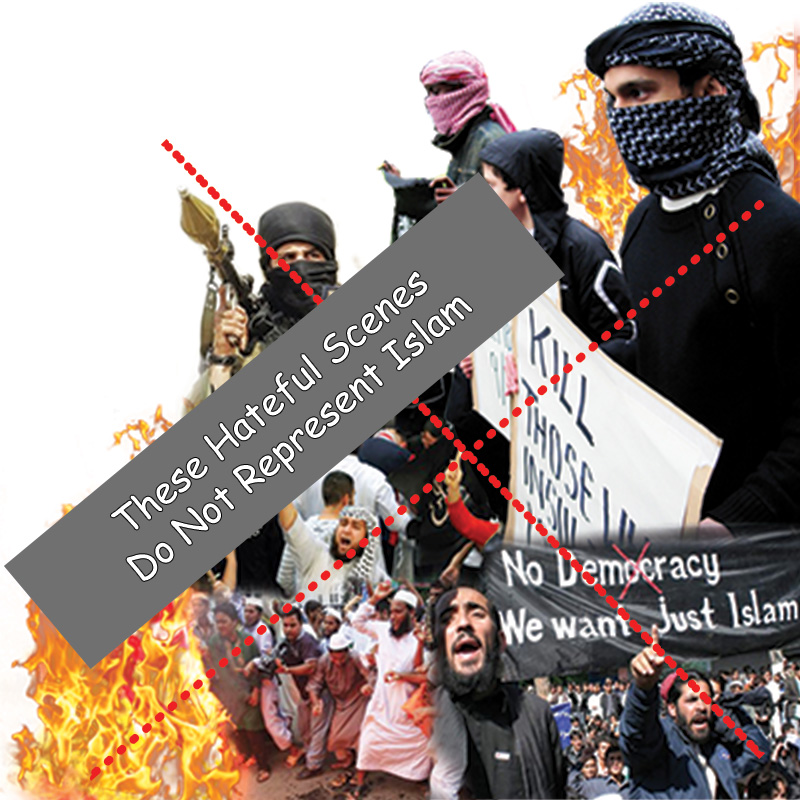 |
THESE HATEFUL SCENES DO NOT REPRESENT ISLAM |
There is no killing in the jihad in the Qur'an. There is no raining bombs down in the jihad in the Qur'an. There are no suicide bombers or cowardly attacks on the civilians. There is no hatred or cursing people in the jihad in the Qur'an. The children of the Prophet Abraham (pbuh), of the Prophet Jacob (pbuh) and the Prophet Moses (pbuh) are not accursed in the jihad in the Qur'an. There are no threats and intimidation in the jihad in the Qur'an. Islam is not that kind of faith.
There is no slaughter, death, hatred and rage in Islam, nor in Christianity or in Judaism. Therefore, if someone says, "I learned from the Qur'an that I must kill, bomb and curse people" then he is lying, or has been mistaught. A radical who says he is a Muslim follows a faith invented solely for the purpose of killing, bombing and cursing. That invented faith does not stem from the Qur'an.
The members of this superstitious faith may never actually have read our Holy Book, the Qur’an, which they kiss and touch to their foreheads and hang on the wall. That is the kind of faith in which everything is dark. It offers hatred instead of love, anger instead of affection, enmity instead of brotherhood, afflictions instead of beauty and ignorance instead of art, beauty, science and culture. It is easy to put a gun in the hand of someone who believes in such a superstitious faith. It is easy to say, "That community are your enemies." It is easy to stir such a person up. It is easy to produce communities of rage.
Why does radicalism or bigotry exist? The answer is evident: Because that is what many people are taught. They know no other faith. That is all the radicals who appear in the name of Islam know as Islam. They have been left in ignorance, in a ghetto. They have been turned away from society, art and science. They have always been misinformed about the concept of "jihad" and have applied it wrongly because that is what they were taught. They have always imagined that by acting on what they were taught they were doing a good thing. They never even imagined they were actually harming themselves, their faith, their own families, their own peoples and, of course, others. However, the "jihad" described in the Qur'an is very much different than the picture of jihad painted by the radicals.
 |
The word jihad comes from the Arabic word "jahd." Its meanings are 1) To work, to strive, to exhibit determination and persistence or self-sacrifice and 2) To control one's lower self. On the basis of these definitions, waging jihad in Islam means to inform the other side, to teach people proper moral values and to turn them away from evil. In doing this, a Muslim must train his own lower self in the direction of moral virtue and train himself to be someone far removed from rage and hatred. In other words, what a Muslim engaged in jihad must do is to train himself on the one hand, and strive to teach people truth and goodness on the other. He must be a role model with his own moral values in order to spread love, peace and affection and to turn people away from evil.
The word "jahd" is never employed in any other sense in the Qur'an. Those who perpetrate slaughter under the name of "jihad" saying "Our point of reference is the Qur'an" are either lying or misinformed.
In the eyes of the Qur'an, those who are now slaughtering people in the name of jihad, suicide bombers taking their own lives as well as lives of defenceless civilians or those who are inciting war are committing a grave sin. The verses of the Qur'an these people misinterpret in the name of war will be set out in detail in the following pages. There is one important point that needs to be remembered here; the great majority of radicals spread violence out of ignorance. They do not know the true faith. Most of them have likely never even read the Qur'an. That is why it is no use to condemn, curse, threaten, imprison or exile someone who kills under the misapprehension he is waging jihad. His problem is that he has not been educated with the Qur'an and has not understood the law of God. Since that is the problem, we have to accept the fact that so long as false education persists, there will also be radicals who are ignorant of what they do. If one properly understands what the problem is, one can also grasp the fact that the only thing that those who spread violence and terror under the name of jihad need is true education.
The main act of terrorism carried out in the world in the past 20 to 30 years, especially those by terrorist groups originating in the Middle East, usually took up the form of suicide bombing. Killing oneself, or suicide, is a sin in the eyes of the Qur'an. But how can a person strap bombs to his chest and walk into a crowd before blowing himself up, or drive a bomb-laden car right into the middle of a crowd of civilians?
The majority of Arab countries were to some extent touched by post-World War II communism. The Ba'ath Party that became strong in Egypt, Syria and Iraq, the Shanghai block that was established under Chinese auspices and quietly placed Arab countries and Iran under its protection, and al-Fatah, which grew under Yasser Arafat's leadership, never concealed their communist/socialist leanings. It is no secret that much blood was shed by Arab socialism mixed with extreme nationalism in Arab countries. Those who are unaware of that history should have a look at the situation in those countries now or how Hafez Assad's legacy is preserved in Syria.
Such savagery is inevitable in the socialist or communist mindset. In that false worldview, putting an end to one's own life is regarded as much a contribution to world progress and to the "cause" as putting an end to someone else's life. Therefore, putting an end to one's own life, regarded as valueless, in order to put an end to other lives also regarded as worthless, is an even greater contribution in the eyes of this savage system. This is an extraordinarily false logic, but that is the subject of separate criticism.
Some people, who are misinformed about Islam, wrongly believe that it allows suicide bombings, when in fact it is a religion of peace and love. The most important reason for this misconception is the effort of the said terrorist organisations to legitimize this horrible act, banned by Islam, through various invented sources and interpretations. If a suicide bomber claims to be perpetrating his action in the name of Islam, then that is a disgrace, and a slander against Islam. There are the most profound and terrible errors here.
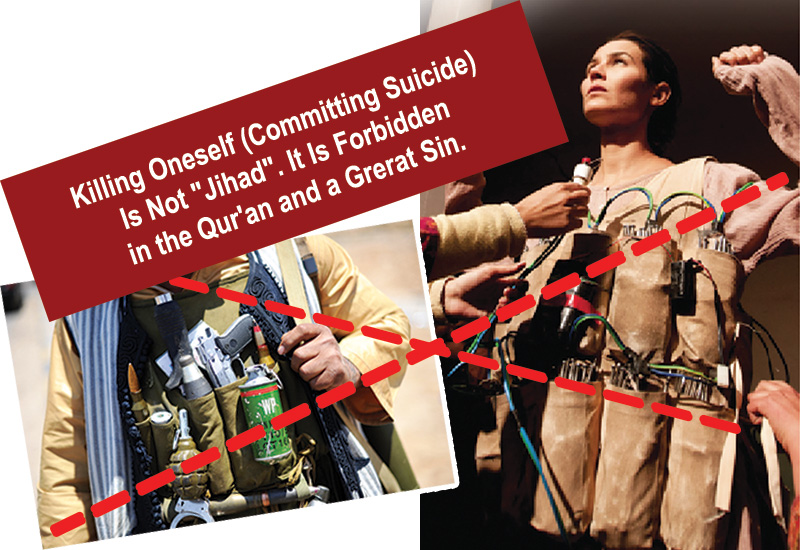 |
KILLING ONESELF (COMMITTING SUICIDE IS NOT "JIHAD". IT IS FORBIDDEN IN THE QUR'AN AND A GRERAT SIN. Some people, who are misinformed about Islam, wrongly believe that it allows suicide bombings, when in fact it is a religion of peace and love. Killing oneself, or suicide, is a sin in the eyes of the Qur'an. |
A Muslim can never kill. This is a sin. God reveals in the Qur'an that "… if someone kills another person – unless it is in retaliation for someone else or for causing corruption in the earth – it is as if he had murdered all mankind." (Qur'an, 5:32)
The verse is explicit. Just like it is a sin and murder to kill someone else, it is also a sin and murder to kill oneself. It is not "jihad," but a sin to blow oneself up in a restaurant. Those who drive their vehicles into people waiting on a bus stop or shopping in a marketplace do not wage jihad by doing so; they are committing an unlawful act. Those who honour and glorify such things and imagine that the person has become a "martyr" are applauding murder, not jihad. Killing defenceless civilians together with himself is not jihad, but murder.
Jihad means to strive through knowledge and science to bring someone to the truth and to establish communication with love and respect; not to kill him.
Martyrdom means losing one's life while striving on the path of God, while seeking to spread the love, friendship and brotherhood demanded by Islam using fine words and through goodness. Killing is a murder and a sin. It is not a virtue to be honoured. And those who perpetrate attacks that target innocent civilians do not attain the rank of martyrdom; they are only committing the unlawful act of murder.
But suicide bombers and their supporters spread the propaganda of a religion that commands others' deaths. And their religion is not the religion of God, either. Very few of those who follow that faith may realize that. There are many people who imagine this false religion to be true and who seek to adhere to it.
The real problem is this: People who do not know their own religion are being diverted toward nonsense. And unless they learn their own religion and the true love in the Qur'an, there will continue to be suicide bombers and those who encourage and even honour them. Military precautions are not the way to teach them the truth. The only way is correct education. And in order to provide a true education, people of love from among sincerely devout Muslims, Christians and Jews must all come together. Once the power of unity has been established, then those people on the wrong path will begin to follow the right path.
Politically-inspired suicide attacks in the Middle East initially emerged in the 1980s, during the Lebanese Civil War, when Hezbollah began to use suicide attacks against its targets. From then on until the early 21st Century, some 200 suicide attacks were carried out in different parts of the world. Yet, it was only in the 2000s when these attacks began to grab the headlines with an ever-increasing frequency as the number of total attacks over the past three decades reached 3,500. Only in 2013, 291 suicide attacks were carried out in eighteen countries, claiming the lives of 3,100 people, marking a dramatic increase of 25% compared to previous year (with 230 attacks).
Most of these attacks were staged in Muslim countries. The Middle East, with Iraq coming in at the top of the list, saw too many suicide attacks to count over the last ten years. Afghanistan, Pakistan, Syria, Lebanon, Tunisia, Libya, Somalia, Mali and Nigeria are among the Muslim countries that are frequently hit by suicide attacks.
What drove the increase in the attacks? The political instability in these countries is an important factor. Despite the common assumption that suicide bombings target occupying powers, only 32% of the attacks were actually carried out in countries where a foreign army was present. 68% of the bombings target the own citizens of the country; in other words, innocent civilians are overwhelmingly the victims in these attacks.
In countries like Iraq and Syria, the attacks are usually prompted by sectarian and ethnic differences, while in Egypt they are usually carried out due to conflicts between nationalist secular forces and Islamic groups. The suicide attacks usually target the most crowded areas like restaurants, markets, mosques and public transportation; places where civilians can easily be found and where women, children and the elderly, are specific targets in these attacks. Indeed, attacks can even be perpetrated as Muslims are worshiping during the Friday prayers, as we've seen in Iraq, or while religious celebrations are going on, as in Yemen. This is very thought-provoking.
When the perpetrators are asked to explain the reasoning behind their actions, because of their deficient educational background and unawareness of true Qur'anic moral values, which in truth embody forgiveness, peace and love, they claim to be doing these atrocities in the name of Islam. For this reason, explaining the morals of Islam based on the Qur'an is a priority. It is essential to start a world-wide campaign to this end.
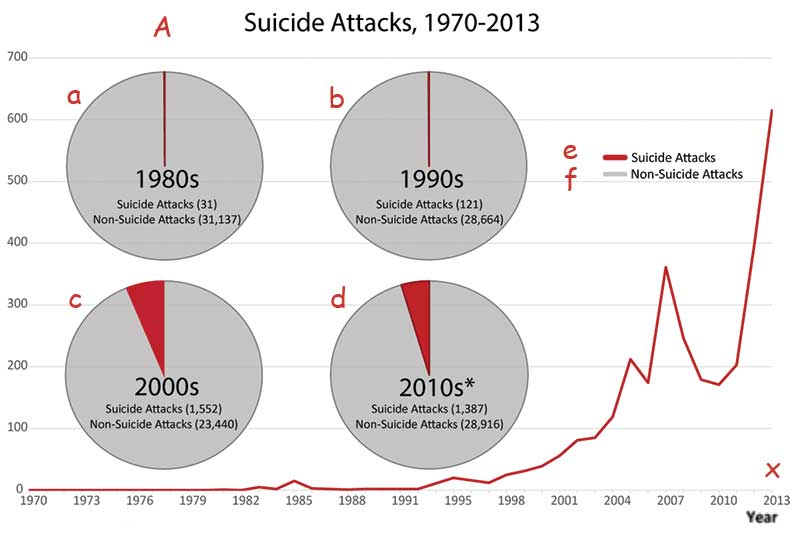 |
A. Suicide Attacks, 1970-2013 |
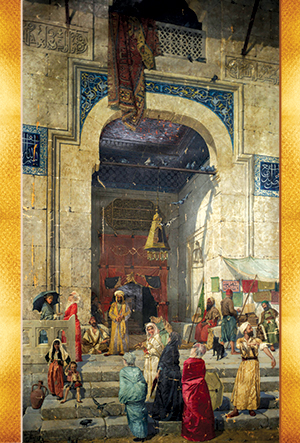 |
The reason for this section is to show the false nature of claims made by fanatics who seek to add superstition to Islam and some opponents of Islam, who in turn misuse the unpleasant ideas of those fanatics that some verses of the Qur'an are no longer valid (Surely the Qur'an is beyond that). They cite this verse as supposed evidence for their claims:
Whenever We abrogate an ayat or cause it to be forgotten, We bring one better than it or equal to it. Do you not know that God has power over all things? (Qur'an, 2:106)
Those who twist their tongues against the Qur'an have misinterpreted this verse as evidence to allow them to impose their own superstition. They have foolishly imagined that they can invalidate some verses and even replace them with fabricated hadiths. Some opponents of Islam, on the other hand, maintain that there are verses about the use of intoxicants or war that no longer apply and seek to divide Muslims into those who abide by that and those who do not.
The true interpretation of this verse is as follows;
The Arabic word "ayat" in "Whenever We abrogate an ayat" is singular. The word means sign or miracle when used in this form. When the word "ayat" appears in the singular in the Qur'an, it always means evidence or sign, and that is how it is translated in all other verses. The word "ayat" used to refer to the verses of the Qur'an never appears in singular form in the Qur'an.
The meaning here is therefore not "verses of the Qur'an" but "signs, rules and Sharia" that went before it. According to this verse, some practices and commandments applied by previous communities to whom Divine books were sent down, that is, the Jews and the Christians, but which were forgotten in time, have either been recalled or else abrogated by the Qur'an. A similar or better version has thus been brought forth with the Qur'an.
We also need to concentrate on the words "cause it to be forgotten" in the verse. In order for one commandment to abrogate another, the earlier one has to have been "forgotten." Since the Qur'an has remained unchanged for 1,400 years there can be no question of one verse replacing another. The commandments that fanatics allege have been abrogated have not been forgotten; they are still in the Qur'an. This clearly shows that the abrogation being referred to here is not of one verse by another, but of commandments belonging to earlier communities that have since been forgotten. Commands that have been sent down to earlier societies but "forgotten" have been restored with the Qur'an, with more auspicious or similar versions being sent down to those communities.
In short, the claims by some so-called scholars that "The verses of the Qur'an that preach love, mercy and compassion, and advice establishing amiable relations with the People of the Book (Jews and Christians) are now void" are invalid. No verses of the Qur'an are nullified. The Qur'an is binding in its entirety until Judgment Day.
As our Lord explicitly states in a verse, the Qur'an is a "preserved" Book.
It is We Who have sent down the Reminder [the Qur'an] and We Who will preserve it. (Qur'an, 15: 9)
It is impossible for some verses in a book which is "preserved" and whose commandments apply to all Muslims to be regarded as valid, while others are not. The perfection in the entirety of the Qur'an, its mathematical and scientific miracles, the fact that it is a guide and the verses regarding how it has been preserved all rebut these claims made by fanatics and some opponents of Islam.
Those who reject the Remembrance [the Qur'an] when it comes to them –truly it is a Mighty Book; falsehood cannot reach it from before it or behind it – it is a revelation from One Who is All-Wise, Praiseworthy. (Qur'an, 41:41-42)
Let us now look at where these people have gone wrong.
 |
Some opponents of Islam refer to moderate Muslims as "Meccan period Muslims." In their view, the time when our Prophet (pbuh) was in Mecca was a peaceful time of no wars, yet wars suddenly started following our Prophet's (pbuh) migration to Medina. Some people claim, on that basis, that the proponents of war in Islam recognize only the verses revealed in the Medina period, while peace-loving Muslims recognize only the verses from the Meccan period. That idea is as illogical as it is ignorant.
As we have already seen, the essential precondition for a Muslim to acquire the identity of a Muslim is to believe in all the verses of the Qur'an, without exception. If someone rejects a single verse, then he loses the attribute of being a Muslim as described in the Qur'an. There is therefore no possibility in the eyes of the Qur'an of someone who says, "I am a Muslim" to discriminate by saying, "I recognize this verse but not that one."
It is true that there was no fighting in the Meccan period in the life of our Prophet (pbuh), but that there was fighting in the Medinan period and that verses were sent down concerning those particular battles. In order to understand the reasons for this, we need to understand the difficult conditions in the time of our Prophet (pbuh).
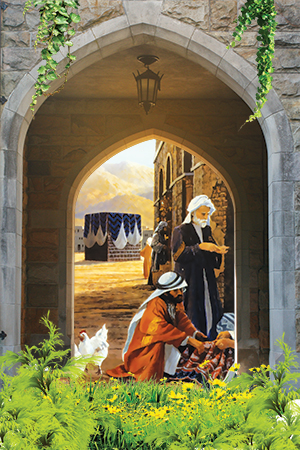 |
Muslims lived as a minority in the pagan society of Mecca and were exposed to much oppression. Many Muslims were physically tortured, some were martyred, most had their homes and possessions pillaged and they were subjected to constant insults and threats. Yet Muslims continued to live without resorting to violence, merely keeping their distance from the idolaters and calling on them to live in peace. |
The revelation to our Prophet (pbuh) took a full 23 years. During the first 13 years of this, Muslims lived as a minority in the pagan society of Mecca and were subjected to tremendous pressures. Many Muslims were subjected to physical torture, some were martyred, the homes and possessions of most were looted and they were constantly exposed to threats and insults. Yet Muslims continued living without resorting to violence, merely keeping their distance from the pagans and always calling them to the path of peace.
Yet the aggression of the pagan communities in question was unrelenting.
The Quraysh initially seemed to regard the prophethood of Muhammad (pbuh) as unimportant. While continuing not to believe, they made no protest against the Prophet's (pbuh) call so long as he said nothing against their idols. When they saw the Prophet (pbuh) however, they attacked him verbally. They unwisely mocked and belittled Muslims. The Quraysh's "verbal assault" period began in that way.
The Qur'an describes the position in these words:
Those who did evil used to laugh at those who had faith.
When they passed by them, they would wink at one another.
When they returned to their families, they would make a joke of them.
When they saw them, they would say, "Those people are misguided." (Qur'an, 83:29-32)
Mecca was the centre of idolatry. Mecca would fill to overflowing every day with people coming to visit the Ka'aba and the idols around it, thus earning the Quraysh a good deal of money and prestige. The Quraysh regarded the spread of Islam in Mecca as a threat, because they thought that this would act against their own interests and also attract the hostility of other tribes. They also knew that Islam regarded everyone as equal and made no discrimination on grounds of lineage or wealth. Leading members of the Quraysh therefore believed they needed to take precautions to stop the spread of Islam. These "precautions" frequently included the torture and even the killing of Muslims. (Ibn Hisham, 1/287)
The pagans of the time could not do much harm to members of strong and eminent families, such as Hazrat Abu Bakr and Hazrat Uthman but they viciously mistreated poor and unprotected Muslims. Worthy Muslims exposed to such severe mistreatment included Abu Fakih, Khabbab ibn al-Aratt, Bilal ibn Rabah, Suhaib ar-Rumi, Ammar ibn Yasir, Yasir ibn Amir and Sumayyah bint Khayyat.
This mistreatment of Muslims took place simply because they had faith and preached Islam to others. Despite all that oppression, torture and violence, Muslims never harmed those who were harming them, which is one of the requirements of Islam, and never tried to defend themselves, which is their most basic human right. Seeing that the Muslims were not fighting back, the Quraysh stepped up their aggression and tortures. The Quraysh in question were now martyring Muslims the moment they saw them.
As the persecution worsened, the Muslims, who did not respond to it in any way and did not even defend themselves since the Qur'an prohibits the shedding of blood, found themselves unable to remain in Mecca any longer. That meant they had to migrate to Medina.
As the idolaters' attacks grew in severity in Mecca, the Muslims migrated to the city of Yathrib (later known as Medina), where the climate was a great deal freer and friendlier, and set up their own administration there. Yet even after they established their own political structures, the attacks by the pagans of Mecca did not come to an end. The Quraysh followed the Muslims and persisted in violent attacks against them. But our Prophet (pbuh) and the Muslims around him never embarked on a battle against the idolaters.
No person, community or country in the world will fail to respond if they are attacked. They will always respond to the aggressor in "self defence" and at the very least, take defensive action. People who engage in self defence are invariably exonerated by the courts, and countries that act in self defence are exonerated under international law because they have been subjected to an unjust attack, and people's lives, families and loved ones, or countries' peoples, lands and honour, are endangered.
Our Prophet (pbuh) was given permission to engage in self defence for himself and his community in the following verses which were revealed after the migration to Medina:
Permission to fight is given to those who are fought against because they have been wronged – truly God has the power to come to their support – those who were expelled from their homes without any right, merely for saying, "Our Lord is God"… (Qur'an, 22:39-40)
With these verses, the Muslim community that had been unjustly forced into exile merely for saying "Our Lord is God" started to make preparations to defend themselves. As explicitly stated in the verse, a Muslim community "who are fought against because they have been wronged" are permitted to defend themselves; but they are not told to attack. Following this verse, Muslims began to defend themselves and fought back against the ferocious community that was attacking them. Verses concerning war and defence revealed after that contain descriptions regarding measures during the fighting taking place then. To put it another way, a special description is provided specific to the situation in that particular war. Therefore, all the verses about war in the Qur'an were specially revealed as referring to the particular attacks taking place at that time to enable us to see the difficult conditions of the time and the justice of our Prophet (pbuh).
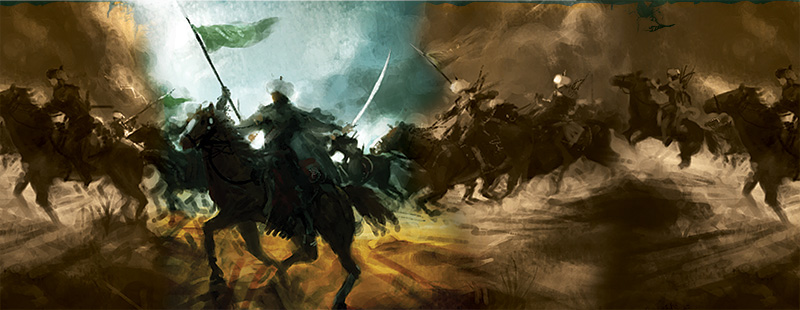 |
The pagans of the time barbarically mistreated and tortured Muslims, in a way never seen before. Our Prophet (pbuh) was given permission in the verses to engage in self defence for himself and his community in the face of these attacks and wrongdoing. |
One important point that needs to be remembered regarding the battles described in the Qur'an is "the other side" in the fighting. Some religious and historical sources say that the battles fought in the time of our Prophet (pbuh) were against the Jews. Some people who read those sources then go on to look for anti-Semitism in the Qur'an, claiming that the verses revealed for specific battles in the Qur'an are generally directed against the Jews. That is a grave error, however.
It was the pagans who engaged in that persecution against our Prophet (pbuh) and Muslims. A great many of these were idol-worshipers. Their aim was to prevent any harm from coming to their idols and perverse beliefs. Some were hypocrites and polytheists who had come out of Jewish communities but it would be very wrong to refer to these as Jews. In the same way that it would be very wrong to regard a polytheist or hypocrite who emerged from a Muslim community as a "Muslim," it is equally wrong to regard polytheists and hypocrites who emerged from among Jews and began spreading violence as "Jews." It is impossible for a true Jew to start fighting and take the lives of believers.
The Qur'an curses anti-Semitism. For that reason, those who look for expressions of enmity toward the Jews in the Qur'an return empty-handed; people who interpret the verses in question as referring to fighting against the Jews need to understand this. Our Prophet (pbuh) always enjoyed good relations with Jews. He treated them with respect and affection, and true, devout Jews treated our Prophet (pbuh) with that same respect and affection. This topic is explained in detail later in the chapter about the People of the Book. (See chapter "The Outlook of Islam on the People of the Book")
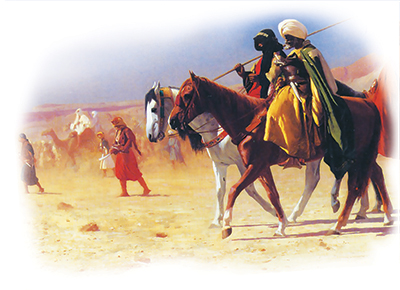 |
The Qur'an is quite explicit on when and how war is to be waged:
Fight in the Way of God against those who fight you, but do not go beyond the limits. God does not love those who go beyond the limits. (Qur'an, 2:190)
War can only be waged against those who attack Muslims; it must be a defensive war. It is absolutely prohibited in the Qur'an for Muslims to attack the other side for no reason. In defensive wars, the properties of innocents, civilians, women, children and the elderly as well as holy sites such as churches and synagogues are inviolable.
What God commands Muslims in the Qur'an is that they must always keep justice at the fore, even if they are angry at a community because of its injustices and aggression. God reveals in one verse:
You who believe! Show integrity for the sake of God, bearing witness with justice. Do not let hatred for a people incite you into not being just. Be just. That is closer to devoutness. Have awe of God. God is aware of what you do. (Qur'an, 5:8)
For example, in one verse God prohibits Muslims from going beyond the limits regarding communities that try to stop Muslims from entering the Ka'aba, advising them to treat them and everyone else with kindness:
... Do not let hatred for a people who debar you from the Masjid al-Haram [the Sacred Mosque] incite you into going beyond the limits. Help each other to goodness and piety. Do not help each other to wrongdoing and enmity. Have awe of God. … (Qur'an, 5:2)
Muslims are warned by Almighty God not to overstep the bounds, even though they have deliberately been prevented from performing their religious obligation of the Hajj (pilgrimage) and have been treated unjustly. God commands Muslims to behave justly even under those conditions, and commands them to behave well and not be angered. Muslims have an obligation to obey this commandment in the Qur'an, no matter what the circumstances.
The verse that describes the only justification for fighting – self-defence – also contains another condition on the subject of war: not to go to excess. This means that in the event of an attack a Muslim must simply defend himself, must not overreact and must take no other action than defensive measures. In other words, aggression, violence, anger and extremism are banned in the Qur'an.
Other verses reveal the obligation to engage only in defence war against aggressors in these terms:
God does not forbid you from being good to those who have not fought you in the religion or driven you from your homes, or from being just towards them. God loves those who are just. God merely forbids you from taking as friends those who have fought you in the religion and driven you from your homes and who supported your expulsion. … (Qur'an, 60:8-9)
There is an important distinction here. It is unlawful for Muslims to attack people who have never attacked them, even though they are strongly opposed to Muslims on the level of ideas. A Muslim has a responsibility to treat such people with respect and justice. According to this verse, Muslims are only permitted to engage in defensive warfare against people who oppress them because of their beliefs and actually physically attack them; against people who initiate hostilities, in other words. Everyone will, of course, defend himself if he is attacked. This is the right of every person, nation and country, and is also the correct thing to do.
The fact that our Prophet (pbuh) engaged in no self-defence until the revelation of the verses permitting such activity represents enormous self-sacrifice and religious devotion. Until that time, our Prophet (pbuh) had merely resorted to methods of compromise and trying to convince the other side, as required by the verse "… argue with them in the kindest way …" (Qur'an, 16:125) even though the sole aim of the pagan Quraysh was slaughter.
Having made that important point, we shall now examine all the verses that the peddlers of superstition and opponents of Islam seek to offer as evidence for the violence perpetrated supposedly in the name of Islam, and will refute their errors on the subject one after the other.
Before looking at these verses, we need to know that all the battles described in the Qur'an were waged against a particular community in that region, and that these special conditions are expressed in the verses. That community was a polytheistic one, with which an agreement had been reached. Therefore, all these battles were determined by the behaviour and aggression of the community in question which had breached the peace and friendship agreements. The verses sent down therefore concern the state of affairs at that time and describe that specific climate.
In order to better understand this fact, let us look at the definition of "polytheist" at the time and the agreements reached with them:
 |
Although, according to some commentaries of the time, the word polytheist simply means "those ascribing equals to God," the term really refers to pagans who worship idols, who explicitly ascribe equals to God and who believe in countless deities and who are not Muslim, Jewish, Sabaean, Christian or Magian.
While the Qur'an refers to the various religions that existed in Arabia during the time of the coming of Islam, the polytheists are always mentioned as a separate group. Looking at the time of our Prophet (pbuh), although it was made lawful to marry women from and eat food prepared by the People of the Book, Jews and Christians; it was forbidden to marry women from or eat food cooked by the Magians and Sabaeans, and also the polytheists.
After our Prophet (pbuh) migrated to Medina, he signed numerous agreements with polytheistic communities and people living in the region, and always invited them to be united in order to build peace, despite the extreme attitudes of the polytheists. This proved that people could live in peace with peoples of different beliefs, faiths and languages. One of the greatest proofs that he was a messenger of peace and love is that the first text he had written was a peace agreement. After capturing Mecca, the Prophet Muhammad (pbuh) even released all the polytheists who had previously tortured Muslims and treated them with great compassion. This superior moral virtue exhibited by the Prophet Muhammad (pbuh) was something that had never been seen before in Arab society, and was met with great approval.
The Prophet (pbuh) is a role model for all Muslims on the subject of the implementation of justice in conquered territories. Our Prophet (pbuh) applied the justice revealed in the Qur'an to the inhabitants of countries that were taken over and made agreements with them that would content both sides and under which nobody would suffer the slightest victimization. Our Prophet (pbuh) and the Companions with him represented a community that established justice between people, as expressed in the verse, "Among those We have created there is a community who guide by the Truth and act justly according to it." (Qur'an, 7:181)
The agreement that our Prophet (pbuh) made with the Christian Najran people in the south of the Arabian peninsula is one of the finest examples of his understanding and justice.
One of the articles in the treaty reads as follows:
"The lives of the people of Najran and its surrounding area, their religion, their land, property, cattle and those of them who are present or absent, their messengers and their places of worship are under the protection of God and guardianship of His Prophet." (The Pact of Najran, Article 6, http://www.islamicresources.com /Pact_of_Najran.htm)
Following the agreements with all the societies in that region, our Prophet (pbuh) founded the state of Medina by drawing up the first constitution in the history of Islam, the Constitution of Medina. This was the first and most perfect example of a democratic and multilateral constitution.
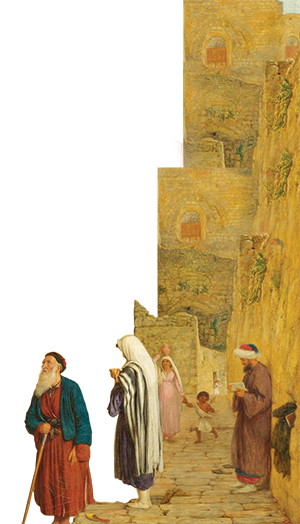 |
The Constitution of Medina was the first pluralist and the most democratic constitution in history, showing the protective attitude of Muslims toward the rights and laws of members of all other faiths and even idolaters. |
With the Constitution of Medina, the first constitution of the state of Medina, our Prophet (pbuh) brought a democratic and peaceful order never before seen on the Arabian Peninsula to an urban community composed of various races, religions and tribes.
Under this constitution, all the communities in Medina were to live together in peace, arrange their lives according to their own faith and beliefs, and have the power to operate and regulate their own institutions and laws. In doing this, they would live together in peace and unity with all the communities in Medina.
The Constitution of Medina was written in 622 AD, under the leadership of the Prophet Muhammad (pbuh) some 1,400 years ago, to respond to the demands of peoples of differing beliefs, and has come down to us as a written legal treaty. As a result, communities that were hostile to one another for 120 years and consisted of different religions and races were included under this constitution. By means of this agreement, the Prophet (pbuh) showed that conflict could come to an end between communities that used to attack one another at every opportunity, were hostile to one another and never compromised with one another, and that they could easily live together.
Under the Constitution of Medina, everyone was free to make his own religious, political or philosophical choices, free from any pressure from anyone else. They could establish a community with people holding the same views. Everyone was free to exercise his own justice system. However, nobody committing an offense was to be protected by anyone else. The parties to the agreement were to help and support one another, and would be under the protection of the Prophet Muhammad (pbuh). Disagreements between parties would be brought to the Messenger of God (pbuh). Indeed, even polytheists preferred the arbitration of our Prophet (pbuh), as he was the most just person of all.
This treaty drawn up by our Prophet (pbuh) was implemented gradually between 622 and 632 AD. Through that constitution, people moved beyond the tribal structure based on ties of blood and family, and people with very different geographic, cultural and ethnic roots came together to constitute one whole. The Constitution of Medina also established very wide-ranging freedom of belief and religion. One of the items expressing that freedom reads:
"The Jews of Banu 'Awf are a community along with the believers. To the Jews their religion and to the Muslims their religion." (The Constitution of Medina, http://www.islamic-study.org/jews-prophet-page-2.htm)
The Constitution of Medina consists of 47 items. Items 1 through 23 concern Muslims, while items 24 through 47 concern Jewish tribes settled in Medina. Reference being made to Christians, who were much fewer in number, is also important in terms of participation by members of different faiths.
An analysis of the Constitution of Medina in a report titled "A Reassessment of Medina Charter according to Professor Leonard Swidler's Pluralism Perspective" states that the Constitution is a significant document in displaying the Prophet's efforts in uniting the city and bringing the groups together around the law, which was explicitly announced to the people.
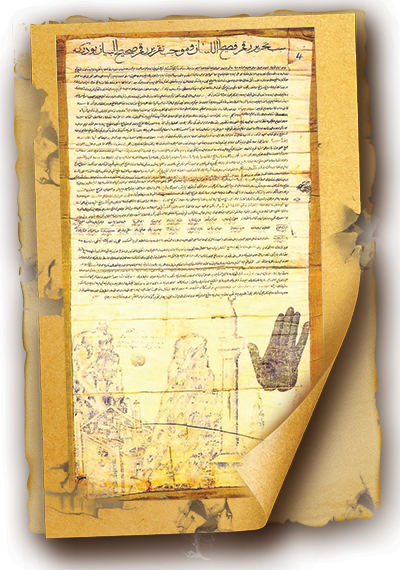 |
This charter of priviliges has been honoured and faithfully applied by Muslims throughout the centuries in all lands they ruled. |
According to this report, in terms of law, each individual had equal rights, enjoyed the freedom to choose their own religion and participating in war together with Muslims while under all circumstances, they were prohibited from engaging in any separate agreements with the enemy, showing an effort to establish a strict solidarity of the Medina groups. The author of the report says that this political and religious text aimed at establishing a new society around the values of equality and freedom. As it was emphasized in the Constitution, the superiority of the law over the individual was the basic step in attaining the goal of securing an atmosphere of dialogue and co-existence. The items of the Constitution also signified the equal responsibility of each individual in defending the city. According to this report, given that the names of all the groups in the city are cited one by one, the Constitution - and thereby the Prophet - recognized all these groups in the city as legal entities and took them into account. (Kenan Çetinkaya, Amerika'da Diyalog anlayışı ve Medine Vesikası [Understanding of Dialogue in America and Medina Charter])
The text of the Constitution of Medina shows that Muslims adopted a protective attitude toward the rights and laws of the polytheists, and that these polytheists wished to act alongside Muslims in the defence of Medina. Such an attitude toward the polytheists is not at all surprising because in the Qur'an, Muslims have a responsibility to protect polytheists with whom they have signed agreements, even at the cost of their own lives. (This will be set out in greater detail in due course.)
In conclusion, the constitution in question is regarded as a highly important document containing the nucleus of unity and union, love and affection, friendship and peace, and represents an example of dialogue between Muslims and non-Muslims in general and between Muslims and Jews in particular. The conception of love and peace of our Prophet (pbuh) was based on the Qur'an but it is hard at present to identify a Muslim society capable of living by that same conception. This is highly important evidence that the first most democratic constitution in history was written and implemented by our Prophet (pbuh).
The subsequent sections of this book therefore need to be assessed in the light of this information. The practices of today's peddlers of superstition are radically different from the advice of the Holy Qur'an, which commands that polytheists be protected and says that the People of the Book (Jews and Christians) enjoy a special status for Muslims, and from the practices of the Prophet Muhammad (pbuh), who always aimed for peace and democracy. The peddlers of superstition are always looking for evidence for unceasing conflict in the Qur'an, yet the Qur'an itself always counsels peace. This important fact therefore needs to be borne in mind while interpreting the verses about war.
◉ This is a message from Muhammad İbn Abdullah, as a convenant to those who adopt Christianity, near and far, we are with them.
◉ Verily I, the the servants, the helpers, and my followers defend them because
◉ Christians are my citizens; and by Allah I hold out against anything that displeases them.
◉ No compulsion is to be on them.
◉ Neither are their judges to be romoved from their jobs nor their monks from their monasteries.
◉ No one it to destroy a house of their religion, to demage iy, or to carry anything from it to the Muslims' houses.
◉ Should anyone take any of these, he would spoil God's covenant and disobet His Prophhet. Verily, they are my allies and have my secure charter against all that they hate.
◉ No one is to force them to travel or to obligate them to fight.
◉ The Muslims are to fight for them.
◉ If a female Christian is married to a Muslim, it is not to take place without her approval, She is ot to be prevented from visiting her church to pray.
◉ Their church are to be repected. They are neihter to be prevented from repairing them nor the sacredness of their covenants.
◉ No one of the nation (Muslims) is to disobey the convenant till the Last Day (end of World).
After seeing the definition of war in the Qur'an, let us now examine the verses about war that are misused by some radicals and used for criticism of Islam by some opponents of Islam:
Kill them wherever you come across them and expel them from where they expelled you. Fitna [sedition, strife] is worse than killing. Do not fight them in the Masjid al-Haram [the Sacred Mosque] until they fight you there. But if they do fight you, then you also fight them. That is how the unbelievers should be repaid. (Qur'an, 2:191)
This verse is one that was sent down after Muslims were subjected to severe pressure and violence and were forced to migrate from Mecca to Medina. The conditions we discussed in detail above came about and Muslims received the command to defend themselves against direct attacks. They used the methods of that community, which never stopped oppressing them, that refused to heed pleasant words and that turned a deaf ear against all calls to peace or negotiation, against it.
 |
However, the verse also contains a reminder of the rules of war: "Do not fight them in the Masjid al-Haram until they fight you there. But if they do fight you, then you also fight them." As we have seen, the only condition for fighting is for the other side to have attacked first. If they do not wage war, if they do not attack, then it is absolutely unlawful for Muslims to fight idolaters.
It is of course very suspicious how the radicals and opponents of Islam who distort this verse ignore this rather important provision. The verse explicitly grants Muslims only the right to self-defence: The verse is not therefore commanding warfare and aggression.
Another important element in the verses is revealed as follows: "Fitna [sedition, strife] is worse than killing." Inciting communities, encouraging hatred, spreading hatred, anarchy and terror by engaging in slander and outright falsehoods thereby producing hostile masses of people is fitna, and the verse tells us that fitna is worse than killing; thus, the communities that attack Muslims are the ones that engage in actual, psychological and covert fitna and the harm they do is very great. Muslims naturally defend themselves when their aggression rears its head.
The way that some fanatics are taken in by hearsay or superstition and declare individuals, societies or faiths to be spreading fitna and then seek supposed evidence for their perversions from verses of the Qur'an is exceedingly wrong. Fitna involves actions that will lead to corruption, such as spreading division among Muslims, leading them into loss and sin by inflicting all kinds of troubles on them, then establishing the infrastructure for mass rebellions and engaging in physical and verbal assaults on Muslims. Therefore, in order to be able to accuse someone of fitna, they have to have committed one or more of these actions. Those who seek to accuse Jews or Israel by branding them as engaging in fitna thus flies in the face of this verse.
According to the Qur'an, it is a sin to accuse all Jews or Israel of engaging in fitna. People who spread fitna may emerge from any religion or country. Yet in the same way that it is impossible to brand all Arabs, Turks or Muslims as spreaders of fitna simply because there are some Arabs, Turks or Muslims who engage in fitna, there is also no question of branding all Jews or all Israelis as spreaders of fitna. According to the Qur'an, a Muslim can dine in the home of a Jew, can be his guest and friend, and can even marry a Jewish woman (this will be clarified in detail in chapter "The Outlook of Islam on the People of the Book"). That being the case, it is impossible for a Muslim to unconditionally brand a Jew as a spreader of fitna. People who make such sweeping claims know nothing of the Qur'an, as we said at the beginning, and are acting out of ignorance resulting from being raised under the influence of countless fabricated hadiths regarding fitna and the Jews. The position of the People of the Book according to the Qur'an will be examined in due course in later chapters.
They would like you to be unbelievers as they are unbelievers so that you will all be the same. Do not take any of them as friends until they have emigrated in the Way of God. But if they run away then seize them and kill them wherever you find them. Do not take any of them as either a friend or helper – (Qur'an, 4:89)
Except for those who seek shelter with people with whom you have a treaty, or who come to you greatly perturbed at the prospect of fighting either you or their own people. If God had willed, He could have given them the upper hand over you and then they would have fought you. If they keep away from you and do not fight you and submit to you, God has not given you any way against such people. (Qur'an, 4:90)
You will find others who desire to be safe from you and safe from their own people. Each time they are returned to fitna they are overwhelmed by it. If they do not keep away from you or submit to you or refrain from fighting, seize them and kill them wherever you find them. Over such people We have given you clear authority. (Qur'an, 4:91)
These verses refer to hypocrites. They say they are Muslims, live among Muslims and appear to be one of them, but actually harbour a great hostility toward God and Islam, and seek to stab Muslims in the back. God reveals that those who die as hypocrites are cast into the lowest circle of hell. As can be seen, because of its two-faced and treacherous nature, hypocrisy is an especially dangerous and despicable human model, quite unlike the deniers or the polytheists.
 |
It is forbidden in verse 89 of Surat an-Nisa' to adopt hypocrites as friends, those who abandon Muslims and who strive to make Muslims fall into the same perversions as themselves. What justifies fighting against them is the state in which the hypocrites in question engage in physical attacks on Muslims. We can see this from the verse that follows, verse 90. As is clear from the words "If they keep away from you and do not fight you and submit to you," there is nothing to be held against a community that does not engage in attacks. The community the killing of which is permitted is quite clearly one that has declared war on Muslims first. Muslims are clearly given the right to defend themselves in the face of attacks here.
In addition, verse 90 of Surat an-Nisa' is another manifestation of the just, forgiving and affectionate language that always favours peace, of the Qur'an. Some hypocrites, who until then had always stabbed Muslims in the back and betrayed them but who later adopted a peaceful attitude toward Muslims are also immune, as we can see from the words; "Except for those who seek shelter with people with whom you have a treaty, or who come to you greatly perturbed at the prospect of fighting either you or their own people." In the same verse God says, "If they keep away from you and do not fight you and submit to you, God has not given you any way against such people," again emphasizing their immunity. This is the very definition of justice.
Verse 91 contains a situation described on the basis of the same conditions. Hypocrites who repent and who say they do not want to fight later return to fitna and begin attacking Muslims again. In that event, the provision regarding war is recalled in the Qur'an, saying that these people are not to be touched as long as they do not attack, but that if they do, then self-defence is legitimate.
We need to remember that the situation described in the verse was a specific one that came about during the Battle of Uhud and concerns those hypocrites who engaged in treachery on the battlefield.
Then, when the sacred months are over, kill the polytheists wherever you find them, and seize them and besiege them and lie in wait for them on every road. If they repent and perform their prayers and pay alms, let them go on their way. God is Ever-Forgiving, Most Merciful. (Qur'an, 9:5)
In order to understand the conditions in the above verse we need to start reading from verse 1 of Surat at-Tawba; in that way we see that the polytheists deserving to be counter-attacked are not "all polytheists" but those perpetrating savage attacks on Muslims and who then come to agreements in order not to fight during the sacred months. The polytheists here are the ones who have cunningly tried to hunt Muslims down and have continued to attack them during the sacred months and have taken Muslims' lives, although they have made a fair agreement with Muslims and they very well knew that Muslims would not enter into a war during the sacred months.
 |
Under these conditions, Muslims are given the right in this verse to defend themselves against savage attacks. As shown in the verse, although the polytheists carried out their savage attacks in the sacred months, Muslims did not respond during those months, as commanded by God. They exhibited patience during those months and only began defending themselves once the sacred months were over. We also see that the verse describes the method that needs to be adopted in defence: seizure, siege and lying in wait on all roads. The primary conditions in wars based on international law are siege and seizure. The passages required for the siege are taken and held and the other side is thus prevented from moving. This verse therefore described the method adopted and now regarded as legitimate under international law. The only difference is that it is not Muslims doing the attacking; they are simply trying to put an end to the attacks against them.
There is also no question in this verse of engaging in any fight against those who stop their attacks and repent. They must be released; that is explicit.
When we look at the very next verse, we find a very important statement that describes the loving and protective spirit of the Qur'an. This verse eliminates all the claims made about Muslims by the opponents of Islam. The verse reads:
Through this verse, Muslims are advised to help a polytheist who has taken shelter with them and seeks their help, even if that endangers their own lives. The verse even suggests that such a Muslim should use himself as a shield to protect such polytheists. To put it another way, he has a responsibility to risk his own life to protect someone who denies God and to carry him to safety.
This is what the Qur'an commands. According to that commandment, someone is not to be killed for not believing in God. On the contrary, he must be protected, even at the cost of Muslims' lives. Therefore, the justification for war has nothing to do with whether the other side believes in God or not or belongs to another faith. The justification for war is that the other side engages in assaults and torture, and takes people's lives.
Another fact set out in the verse is that all people will be under the protection of Muslims so long as they do not attack or engage in extreme behaviour, irrespective of their religion, language, ethnicity or beliefs. A Muslim has a responsibility to protect the People of the Book, or an atheist or a communist, in the same way that he does other Muslims; this is a requirement of being a Muslim; this is the description of a Muslim in the Qur'an. If someone says, "I am a Muslim," he must be protective of others.
This verse is another of those that show the commandments regarding fighting in the Qur'an. When a polytheistic community that had come to a truce with Muslims - in other words, that lived in peace with them as required under those agreements - broke that truce and started attacking, when they tried to force our Prophet (pbuh) to leave his own land and go into exile and when, as the verse explicitly states, they initiated hostilities, Muslims had the right to fight back against them.
The subject we have particularly stressed in all the verses about warfare is also noticeable in this verse. The characteristics of the community to be fought against are set out in great detail here: They wage war on God and His Messenger and go about the world corrupting it. These people do not merely engage in physical attacks on Muslims; they also spread corruption across the world. The verse is speaking of a community that represents a problem for the whole world, that everyone regards as a perverse, corrupt and warlike society.
As in all wars, killing is possible in resisting a community that has actively declared war on Muslims, so long as it is a last resort, and one of the measures that can be imposed is to force those people from their lands. To put it another way, according to the verses of the Qur'an, Muslims are permitted to do things that would normally be forbidden – such as killing and forcing people into exile – only in the event of such a state of war.
We also need to assess this verse in the light of the perspective and evidence we have been looking at in detail. It must not be forgotten that the Medinan period when some verses were sent down was a time of intense fighting. This was purely the result of injustice perpetrated against Muslims "who were expelled from their homes without any right, merely for saying, 'Our Lord is God'..." (Qur'an, 22:40) as stated in one verse. Moreover, as the verse goes on to say, "If they keep away from you and do not fight you and submit to you, God has not given you any way against such people.'' Muslims have a responsibility to stop the fighting and not to insult the other side when it does come to an end.
 |
Looking at a few verses before verse 57 of Surat al-Anfal, we see that communities with which Muslims had reached agreement are being referred to. As almost every verse that gives permission for legitimate self-defence states, these communities are ones which had broken their truce with Muslims and then immediately attacked them.
It is important to produce a deterrent force in the face of that community which engages in one attack after another, refuses to listen to reason and creates corruption by constantly breaking peace agreements because once that is done, those communities that have become accustomed to spreading corruption will no longer have the strength to do so and other groups of polytheists preparing to follow their lead and create corruption and start attacking will thereby lack the courage to do so. This is a necessary and important precautionary measure against that community that breaks every peace treaty, and one that will prevent subsequent conflict.
Great importance is attached to sanctions being "deterrents" in the constitutions of just about all countries of the world and in international law. The aim is to prevent an offense being committed by the same or another person. These precautions in international law are extremely appropriate, and it is unjust, as well as a violation of both common sense and fairness, for people who regard them as necessary for states of law to oppose the same measures when it comes to Islam.
As with other verses, what this verse is emphasizing is the presence of a climate of war. The treaty has been broken, the polytheists have gone on the offensive and there is now no alternative but to respond to that aggression. What this verse is describing is the international rules of warfare. In addition, it also describes something that is not applied under the international rules of warfare: the release of prisoners as soon as the fighting is over. Yet, prisoners of war are still being held in Guantanamo Bay in Cuba even though the war in Afghanistan is over, and organisations such as the U.N. and NATO regard this as legitimate. But the Qur'an does not regard that unlawfulness as legitimate: In the view of Islam, all prisoners must be released as soon as the fighting is over.
The verses concerning war are clearly describing defensive wars under the conditions of the time, being waged solely against polytheists and hypocrites who initiate hostilities and spread fitna and corruption. The main reason why these verses are misinterpreted and used for the policies of rage and hatred of the radicals is that hundreds of false hadiths have been added to Islam and the false perspectives of some analysts. Yet the Qur'an needs to be read with a pure and enlightened mind, purged of all false hadiths and other superstition. When considered in the light of the reality of war at that time, the meaning of these verses is crystal clear.
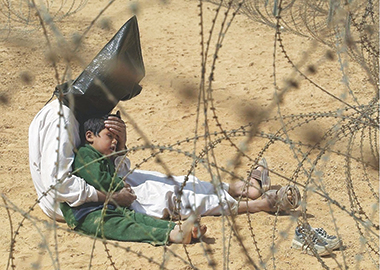 | 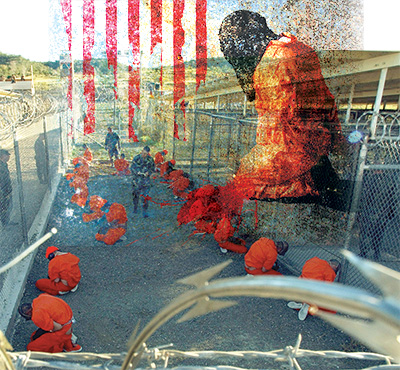 |
Under Islamic law, war is only permissible for defensive purposes, and prisoners must be released when it is over. This is a practice not even found in the international law of war. Indeed, prisoners from past conflicts are still being kept under harsh conditions in prisons such as Guantanamo Bay. |
Those who allege that Islam has spread through war and is a militant religion (surely Islam is beyond that) must realize that such a perspective is in fact diametrically opposed to the teachings of Islam. All the misconceptions regarding Islam stem from fabricated hadiths and superstitions that emerged after the revelation of the Qur'an and the passing of the Prophet Mohammed (pbuh). Some radical groups, based on these fabricated hadiths, misinterpreted Islam and came up with explanations to justify war. That is how they found so-called justification for their attacks on non-Muslims, and even on those Muslims who had different views.
As we explained in detail previously, there is no justification for attacking the other side in the Qur'an. The Qur'an provides the very finest description of democracy and freedoms. In a climate of democracy and freedom there is no question of denouncing the other side as the enemy or seeking to silence it. That climate is one in which everyone is respected and everyone can speak freely and Islamic Sharia describes just that environment. Therefore, there is no justification for offensive warfare in the Qur'an. However, according to the sharia invented by the superstition-followers, there are countless reasons to fight, to attack and to kill. Let us examine this fact through the words of verses of the Qur'an:
Those who employ war, force or coercion to impose Islam on someone are betraying the Qur'an. One of the most explicit statements in the Qur'an is that "there is no compulsion in the religion":
There is no compulsion where the religion is concerned ... (Qur'an, 2:256)
This is an explicit commandment of the Qur'an. No Muslim can disobey that command and force anyone else to be devout. That is expressly forbidden in the Qur'an.
 |
Our Prophet (pbuh) is only an adviser. He has a responsibility to preach and introduce communities to Islam, the last revealed religion. At that time, some of those who heard about Islam from the mouths of our Prophet (pbuh) and other Muslims came to believe, while others did not. As explicitly required by the Qur'an, neither our Prophet (pbuh) nor the other Muslims with him ever resorted to compulsion. Our Prophet (pbuh) is reminded in the Qur'an; "So remind them! You are only a reminder. You cannot compel them [to believe]." (Qur'an, 88:21-22) Compulsion is therefore absolutely forbidden.
According to the Qur'an, all Muslims have a duty to tell people of the moral values of Islam, but nobody can use compulsion and say, "You must become a Muslim" or "You must perform the religious observances." The purpose of the Qur'an is to bring love and peace to the world. Such pressure is therefore incompatible with the Qur'an.
If your Lord had willed, all the people on the earth would have had faith. Do you think you can force people to be believers? (Qur'an, 10:99)
We know best what they say. You are not a dictator over them. So remind, with the Qur'an, whoever fears My threat. (Qur'an, 50:45)
Say: "Unbelievers! I do not worship what you worship and you do not worship what I worship. Nor will I worship what you worship nor will you worship what I worship. You have your religion and I have my religion." (Qur'an, 109:1-6)
Since force and compulsion are prohibited in the Qur'an, there is no justification for war, aggression, enmity or anger. What things, apart from converting, would Muslims compel polytheistic communities to do? It is clear that it is unlawful for someone to be forced to convert. Therefore, according to the Islam of the Qur'an, imposing Islam can never be a pretext for war.
Islam respects all ideologies, all nations, all ethnic groups, all ideas and all faiths. Islam is a religion in which all ideas are listened to and that permits the maximum possible freedom of ideas. War due to any clash of ideas or clash of ethnicities is of course impossible in a faith with such an excellent conception of democracy and freedom.
According to the Qur'an, a Muslim leader must be someone who also embraces Christians, Jews, atheists, communists, agnostics, Buddhists and people who adhere to other beliefs and ideological systems in the community he leads. He must implement complete freedom of ideas. He must allow people complete liberty.
Conflict, slander and hypocritical people appear where there are no freedoms. He must prevent that and do what the Qur'an requires. As stated in the verse "You who believe! Be upholders of justice, bearing witness for God alone, even against yourselves or your parents and relatives." (Qur'an', 4:135) every believer has a responsibility to maintain justice without regard for individuals, beliefs or origins, even if that works against himself.
How can there be enemies in Islam? Islam is a religion that requires all people to be equal and brothers. According to Islam, no matter what someone's colour, language, religion, race, citizenship or social standing, he is worthy of respect simply for the fact that he is an entity with soul. As all the revealed religions say, human beings are brothers as we are all the children of the Prophet Adam (pbuh). This principle of brotherhood is a requirement of religious belief.
Islam is opposed to all fascist-type ideologies and ideas and Darwinist/materialist philosophies that are based on racial superiority and divide people into false categories such as "advanced" and "primitive." It therefore engages in an intellectual and rational struggle against these conflicts that these ideologies bring with them, and has no room for them within itself.
The rule in Islam about all humans being worthy of respect represents the basis of all relations between people. In the view of Islam, even someone who acts wrongly always has the potential to be turned in the direction of goodness. It is therefore impossible for a true Muslim to have any enemies. Every Muslim has a responsibility to treat others with affection and to tell them about moral virtues, not to make enemies with others and plot to bring them down.
While there is no distinction among people on the subject of superiority when they are addressed in the Qur'an, the use of the term "the sons of Adam" shows that in that respect all people are created equal:
We have honoured the sons of Adam and conveyed them on land and sea and provided them with good things and favoured them greatly over many We have created. (Qur'an, 17:70)
The way that a religion is heralded by many as a religion of war, even though there are no pretexts as summarised above, stems entirely from the practices of the peddlers of superstition. Some people are generally mistaken about Islam because they are simply unaware of these clarifications regarding it and only witness the practices of the radicals. People with a radical mindset are unaware that they are applying commandments outside the Qur'an and have adopted another faith quite different to the true Islam. However, the religion of Islam and Islamic sharia are based on the Qur'anic verses. Other sources that are based on fabricated hadiths and superstitions have no validity for a true Muslim. So do sincere Muslims who follow the Qur'an desire war? The answer is obvious: No.
 |
VIOLENCE, HATRED AND LOVELESSNESS ARE CHARACTERISTICS OF RADICALS. THEY HAVE NO PLACE IN ISLAM. Some supposed religious leaders are pawns set in motion when needed to create war and turmoil. |
The armaments sector is always kept alive by certain groups. It is also the only sector not affected by economic crises. It is a vibrant sector in which supply and demand never end and in which novelties are always being offered to the market. The way of keeping this sector alive is no doubt "wars." To this end, an ignorant mass of people who regard their own faith as one of war and who are ready to kill and be killed, in other words the radical groups that appear in the name of Islam, are provoked.
Some Neocons and opponents of Islam in the West are entirely correct about violence being spread by the radicals. However, these people are wrong when it comes to some leaders, such as Osama bin Laden. Such so-called leaders are generally people with no interest in Islam and Muslims but who are kept ready under the supervision of various intelligence services. They are immediately involved whenever a climate of turmoil or war is desired. They spend their time in bars and cafes in Western countries, but when the command comes, they let their beards grow, change their clothing and language, assume a typically Middle Eastern appearance and set to work implementing the superstition they have learned over the years.
This scenario has become reality many times; Osama bin Laden was just one of the actors of this scenario. The coming of Hazrat Mahdi (pbuh), the greatest event in the End Times foretold by our Prophet (pbuh), and Muslims' sincere expectations on the subject were used to give the impression by some circles that bin Laden himself was the Mahdi and efforts were made to convince many people of this. The journey that began with bin Laden struck not just Afghanistan but the whole Muslim world; the scenario was to end with images of bin Laden's dead body. This was perhaps the most striking part of the whole plan. Under that plan, the Muslim world would see that their Mahdi is dead and lose all hope and expectations. This was a systematic scenario aimed at the weakening and further exploitation of the Islamic world.
People with radical mindsets are no doubt guilty on the subject, but we must not ignore the forces that feed them. War always serves some people's interests at a time when the armaments industry is so strong. It is usually radical groups who are incited to fight, but it is those who need war for their own wicked ends who pull their strings. These groups ready for war because of their ignorance are an ideal "cover" for these forces behind the scenes; they are merely pawns that can easily be sent to war.
This does not of course mitigate the crimes of those who have fallen into the clutches of radical groups and peddlers of superstition, split up into sects and declared one another to be the enemy, but neither should this important reality be ignored. Indeed, the various organisations that openly stage and manage protests and uprisings, particularly in Muslim countries, have no hesitation about openly expressing their aims.
Considering this, in order for there to be peace, the benefit of all mankind need to be pursued rather than personal advantage, the hunger for land and enmities need to come to an end, and the fanatical mindset has to be eliminated. The true faiths, religious moral values, the believers and the Qur'an are all essential to that end. Conflicts based on a desire for political or material advantage, territory or ideology always grow and assume the most terrible dimensions. What can do away with all this is proper education in the true understanding of faith using the Qur'an as its point of reference. This education can eliminate all these errors and absorb all enmities. Once people's mindset has changed, there will be no grounds for hostility or war and the only way to achieve that change in mindset is through education according to the morality of the Qur'an.
The comprehensively revised form of a CIA report was published in early 2015. The report attracted great attention across the world. While it is a known fact that the U.S. inflicted severe torture on prisoners detained on grounds of suspicion, particularly after September 11, this report documented torture.
The world already knew more or less how intelligence activities worked in the U.S. after September 11 through pictures from the notorious Abu Ghraib Prison, the techniques of persecution emerging from Guantanamo and witness statements and accounts from released detainees. Torture is a practice that was used even before September 11 in the U.S., but the whole world saw in detail in this report what new methods of torture were invented and what funds were appropriated to pay the experts to implement these techniques. So what did the years of torture actually benefit the U.S. or the free world?
We can easily answer that question in the words "nothing at all." U.S. Senator Harry Reid admits that torture achieved nothing other than giving the U.S. a bad name. Contrary to what some Republicans maintain, researchers have confirmed – following an examination of a staggering six million pages of CIA documents – that the agency acquired no vital information at all.
It is a well-known fact that it is next to impossible to obtain real-time or accurate information about radical terror organisations from its leaders or members. Terrorists in possession of such information will either shoot it out with the security forces, military or police or else have themselves killed or commit suicide if they are about to be captured. That has happened time and time again. However, examination of the profiles of people captured and imprisoned by the U.S. shows that the majority were put under arrest without resistance. The information extracted from these individuals were imaginary confessions made to end the torture.
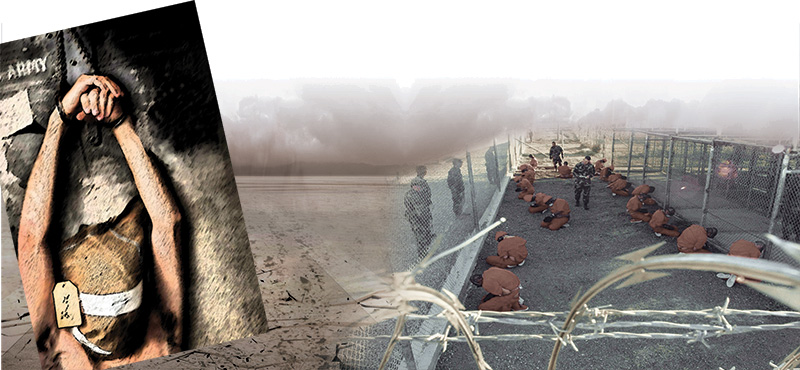 |
Torture is a form of oppression that is also opposed to Christian values. A sincere Christian can never find this reasonable. |
Another point we need to concentrate on is the values which the U.S. fights to protect, and the fact that torture should have no place among those values. The U.S. wants its own people to be free, not afraid of attack, and to build a country in which its own traditional values are preserved in peace and tranquillity, and it spends trillions of dollars to that justified demand and loses thousands of young lives on the battlefield when necessary. However, it still fails to achieve a complete result.
As we all know, although the U.S. is governed by a secular Constitution, it describes itself as a Christian society and it is much more conservative than Europe. Does not the Bible, the holy scripture of that conservative community, command love, compassion, forgiveness and unity? What Christian could support the idea that a person whose having committed any crime merits being savagely tortured to death?
The way for the U.S. to stand up for these fine spiritual values is to remain true to those values when times get tough.
Torture is not a means of combat, but a culture of cruelty. Information gathered through torture during 12 years of war has not helped eliminate or even weaken such terror groups as al-Qaeda or the Taliban. On the contrary, terror organisations have grown even stronger, have spread across even more parts of the world2 and have become even more of a threat by setting up new groups. The U.S. attacks have led to the deaths of scores of civilians, and instead of fighting the causes that gave rise to al-Qaeda through an intellectual campaign, its seeking to eliminate by military means those people influenced by those causes has led to a widening of the terror organisation's sphere of activity by encouraging other sub-groups to join it.3
Responding to a destructive action with an even more destructive method cannot prevent a repetition of that action. Violence will always lead to more violence, and bloodshed to further bloodshed. Therefore, resorting to even more radical techniques in the fight against radical terror will simply result in a vicious circle that confirms the claims of those terror organisations and strengthens their base. That will mean opening the door to further unending conflicts. We need to return to a foundation of common affection and love if future generations are to live in a humane climate where human rights are respected.
2. http://www.ibtimes.com/why-do-people-join-isis-psychology-terrorist-1680444
3. Karen Armstrong, Holy War, MacMillan London Limited, 1988, p. 25
4. Tabari, Ta' rikh, 1, 1850, cited in Majid Khadduri, War and Peace in the Law of Islam, Johns Hopkins Press, Baltimore, 1955, p. 102